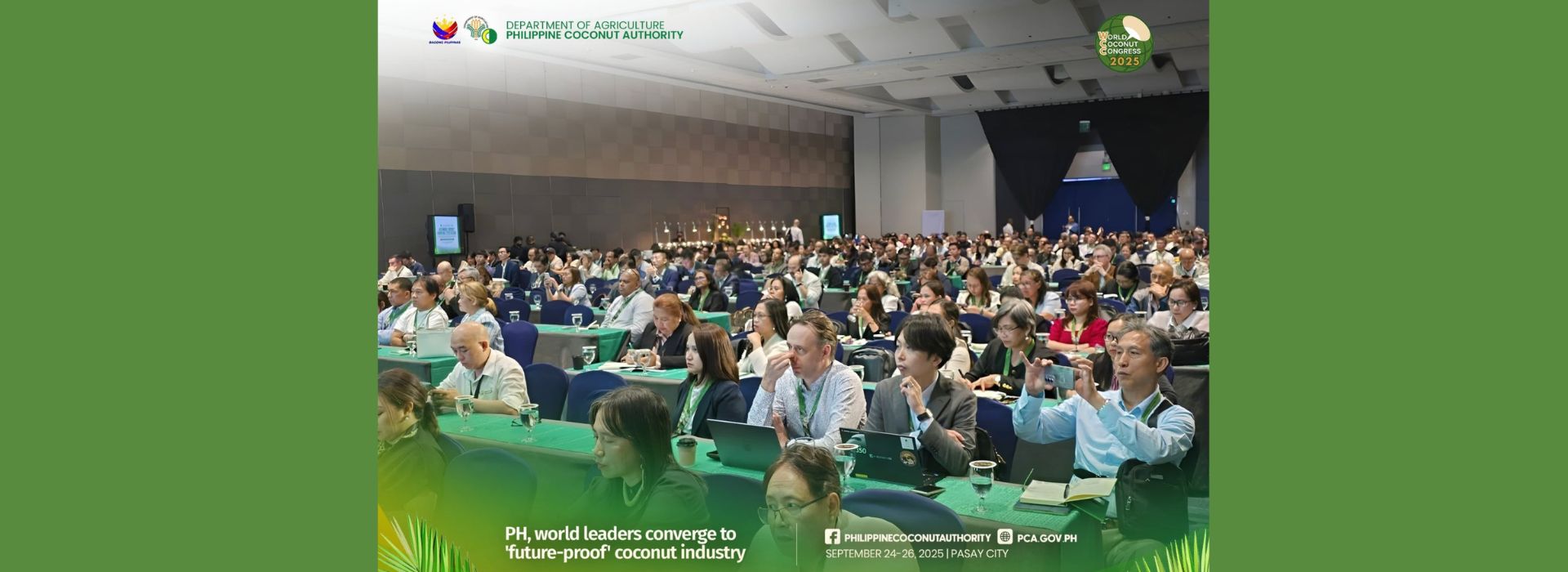The International Coconut Community (ICC) proudly participated in the World Coconut Congress 2025, jointly organized by UCAP and the Sustainable Coconut Partnership (SCP), in association with the Philippine Coconut Authority (PCA), the Department of Trade and Industry (DTI), and ICC itself. Held from 24 to 26 September 2025 at the SMX Convention Center in Pasay City, Manila, the event drew over 500 participants from around the world, uniting government officials, research institutions, industry players, sustainability advocates, and policy makers under the shared theme “Future-Proofing the Coconut.” The Congress and Roundtable sought to confront the pressing supply, social, and sustainability challenges facing the coconut sector today, while charting cooperative paths forward.

ICC’s voice was well represented through high-impact presentations, panel participation, and active engagement in both plenary and roundtable formats. On Day 1, in Plenary Session 1 themed “Global Coconut Industry Landscape”, Dr. Prabhath Kumar, Chairman of the ICC Technical Working Group (TWG), delivered ICC’s keynote-style presentation on “Updates on Supply Side Projects in Coconut Growing Countries.” In his address, Dr. Kumar highlighted the disconnect between rising global demand for coconut products and stagnating yields across major producing countries. He emphasized the urgent need for revitalized replanting initiatives, integration of climate-smart technologies, and coordinated regional investment in seed systems and farmer training. His analysis underscored that unless supply-side constraints are addressed, the coconut sector may falter despite promising market growth.

Immediately following, Administrator of the Philippines Coconut Authority (PCA) and ICC’s National Liaison Officer for the Philippines, Dr. Dexter R. Buted, delivered a presentation on the “Philippine Coconut Situation: The Road to 100 Million Coconut Trees Target.” He shared the bold goals of the PCA to scale up planting efforts, leverage policy support, and convert sustainability ideals into tangible practices. As reported by PCA, Dr. Buted affirmed how the country is transforming sustainability from concept into practice by capitalizing on successful pilot programs and scaling them across provinces. With a call for stronger partnership among local and global stakeholders, he encouraged stakeholders to translate ambition into action and bridge gaps in funding, infrastructure, and farmer engagement. His remarks resonated deeply with delegates as both aspirational and grounded in field realities.

Over subsequent plenary sessions, delegates addressed international trade, market outlooks, regulatory compliance, and evolving consumer demands. Speakers examined the shifting dynamics in the lauric oils market, the ramifications of reciprocal tariffs, compliance challenges under MOSH/MOAH and EUDR frameworks, and the emerging potential of coconut in sustainable aviation fuels. ICC’s participation in these sessions helped reinforce the link between supply-side resilience and downstream market access, with Dr. Prabhath and other ICC representatives engaged in informal dialogues to align technical strategies with market realities.
On Day 2, during the Plenary Session on Health and Nutrition themed “Unlocking the Health Potential of Coconut”, prominent SACH figures added scientific depth to the dialogue. Dr. Mary T. Newport, member of the ICC SACH, author and international speaker on metabolic health and ketones, opened with a presentation exploring how coconut oil may support low-carb dietary strategies. She highlighted emerging evidence on its role in lipid metabolism, neurological function, and metabolic flexibility. This was followed by renowned chemist Dr. Fabian Dayrit, Chair of ICC’s Scientific Advisory Committee on Health (SACH), who presented a meta-analysis of 26 studies linking coconut oil consumption to favorable lipid parameters, reinforcing coconut’s place in health-conscious nutrition. Their contributions added well-balanced scientific rigor to discussions on expanding coconut’s appeal in functional foods and wellness markets.

Parallel to these plenary sessions, ICC’s Deputy Director General, Mr. A.H.N. Chinthaka, took the stage during the Sustainable Coconut Roundtable, particularly in the high-stakes session titled “The Boiling Point: Expert Insights on Navigating the Looming Social and Supply Crisis in Asia.” Mr. Nuwan’s presentation offered a comparative case study of Indonesia and Sri Lanka, spotlighting how long-term neglect of replanting, coupled with climate stress, rising labor costs, and land-use pressures, have eroded the adaptive capacity of coconut farming systems. He proposed collaborative investment mechanisms, resilience forecasting systems, and integrated policy frameworks, anchored in ICC’s regional coordination capacity, to break the cycle of crisis and build adaptive sector resilience.
ICC’s delegation was not limited to speakers alone. Several delegates from the Coconut Development Board (CDB), India, attended under the ICC banner, participating in sessions, bilateral discussions, and networking forums. Their presence helped amplify ICC’s institutional reach across member countries and strengthen technical linkages.


The Congress exhibition ran concurrently, with booths showcasing product innovators, sustainability platforms, and traceability technologies. Many delegates remarked on how well the exhibition complemented the technical discourse, providing tangible interfaces between ideas and market application. Taken as a whole, WCC 2025 delivered palpable energy and substantive outcomes. Delegates returned with renewed resolve to prioritize replanting, foster intergovernmental collaboration, and link sustainability with market rewards. The Congress reaffirmed that success in the global coconut sector hinges not only on supply-side recovery but on the structural alignment of policy, investment, science, and trade. ICC emerged from Manila with strengthened networks, renewed mandate, and a refreshed sense of purpose.

